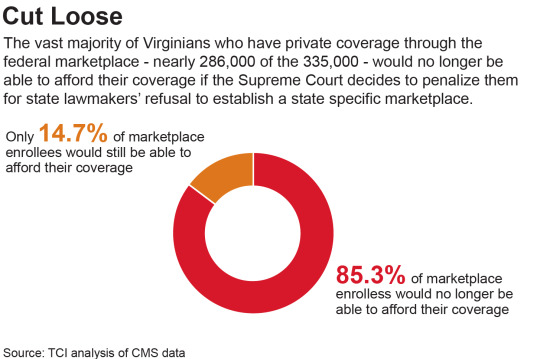June 16, 2015
Down to the Wire
Any day now, the US Supreme Court will be telling Americans whether the health insurance coverage they’ve waited so long for will turn out to be short lived.
Back in March, the Court heard a case called King v. Burwell, filed by opponents of the Affordable Care Act that is bringing health coverage to millions of people.
The lawsuit contends that people getting health coverage through the federal marketplace should lose their tax credits because – the plaintiffs argue – the law allows those credits only for people whose coverage comes from a state-run exchange.
Since Virginia is one of 34 states that decided to use the federal marketplace, rather than creating a state-specific one, a ruling that favors the King claim will penalize thousands of Virginians.
That would mean nearly 286,000 Virginians would no longer be able to afford the private coverage they now have through the marketplace, according to a recent report by the Kaiser Family Foundation. That represents more than 85 percent of the Virginians who have bought coverage through the federal marketplace.

Those Virginians would no longer be able to afford the coverage they have because the tax credits that help pay for their coverage would become unavailable. As the ACA is written, the tax credits are tailored for each person, based on their income, to help make coverage affordable. In Virginia, the average person getting coverage through the marketplace is receiving a tax credit of $258 per month. Losing that credit would cause the average premium to go up by 287 percent.
In other words, more than a quarter of a million Virginians would be left with an insurance bill they can’t afford to pay. But illness and injury don’t just happen to people with insurance. And without coverage, getting sick or hurt means even more unaffordable bills.
A ruling for King would essentially put those 286,000 Virginians in the same boat as the 195,000 other Virginians who have been denied access to quality, affordable coverage since January 2014 because Virginia lawmakers continue to defy common sense and refuse to close the coverage gap.
The frustrating thing is that it didn’t have to be this way.
Sixteen states – including Virginia’s neighbors Maryland and Kentucky – and the District of Columbia embraced health reform by creating their own state-based marketplaces. And their residents will be rewarded with uninterrupted access to quality, affordable coverage regardless of how the Supreme Court rules.
Virginia lawmakers actually agreed to develop a state marketplace back in 2011. But they didn’t follow through out of a growing hostility towards national health reform. More recently state lawmakers refused to take action during the 2015 General Assembly when they had a chance to adopt a stopgap measure to protect their constituents if the Supreme Court rules against allowing tax credits in federal marketplace states.
And that decision is something Virginia lawmakers will have to revisit if the Supreme Court rules for King. If the Supreme Court decides to penalize the 286,000 residents of Virginia and the 6.1 million residents of 33 other states, state lawmakers will be faced with a tough choice. They will have to choose between their constituents’ health and their opposition to the Affordable Care Act. It’s a choice that Arkansas, Delaware, and Pennsylvania lawmakers are already revisiting with the federal government approving their applications yesterday to move towards state-based marketplaces.
The choice should be obvious. Let Virginians keep the health insurance they have. And if that means Virginia has to have a state-based marketplace, then our legislators should put politics aside and do what’s best for the people they represent.
–Massey Whorley, Senior Policy Analyst
